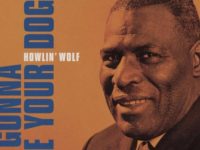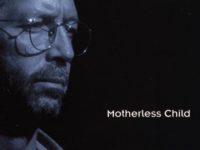The London Howlin’ Wolf Session was payback time for ’60s stars Eric Clapton, Steve Winwood, Ringo Starr, and the rhythm section from the Rolling Stones. After all, vocalist and harmonica player Chester Arthur Burnett – you might know him better as Howlin’ Wolf – had been one of the chief architects, at least in spirit, for the decade of sound and fury that served as the crucible for their careers.
In fact, Burnett long enjoyed a place of special importance for featured drummer Charlie Watts, bassist Bill Wyman, pianist Ian Stewart and the rest of the Rolling Stones. They’d separately recorded his “Little Red Rooster,” which was updated for the original release of The London Howlin’ Wolf Session from August 1971 and also in rehearsal on subsequent bulked-up reissues from 1989 and 2003.
The Stones then insisted that Burnett appear as a guest on their seminal appearance on the Shindig television show in 1965. Eric Clapton covered Howlin’ Wolf’s “Smokestack Lightnin'” while still with the Yardbirds, then tore through “Spoonful” and “Sitting on Top of the World” (also included on The London Howlin’ Wolf Session) as part of Cream.
It’s perhaps no surprise, then, that a series of collaborative sessions in May 1970 were loose and laid back. Each of these rock superstars plays it reserved and respectful, while Burnett gamely howls, and growns and spits. And that’s just his harp work on “Worried About My Baby” and “Who’s Been Talking.”
Burnett’s health was in decline, though, and struggles with heart problems and a kidney disorder probably led to a few uneven moments on The London Howlin’ Wolf Session. Some of the tunes lack the raw and surprising intensity of the Burnett’s originals on Chess. Too, this was reportedly the first time Howlin’ Wolf had recorded outside of Chicago since 1954, and that no doubt led to some ornery moments captured in the bonus rehearsal material.
Chester Burnett, grizzled yet still great, challenged the younger players – and Eric Clapton ends up doing some still-rare and revelatory work on the slide. Ringo Starr (appearing here simply as “Richie,” since the former Beatles drummer was under contract elsewhere) sits in on a muscular new reworking of “I Ain’t Superstitious,” which had been memorably reworked by Jeff Beck.
You also can’t deny the rumbling delight of “Wang Dang Doogle,” a tune perhaps most associated with Howlin’ Wolf. (By the way, included on rhythm there, and on “What a Woman,” is the late Chicago blues sideman Hubert Sumlin, a genius at understated support.)
This isn’t essential listening, and certainly not a starting point for fans of any of the featured musicians. But The London Howlin’ Wolf Session did important work in connecting the dots on a key influence for these boomer bands – and it still provides new insight into the underpinnings of their creative passion.
- ‘Together Through Life’ Remains One of Bob Dylan’s Most Low Key, Organic LPs - April 15, 2024
- Why Joe Jackson’s Retro ‘Body and Soul’ Said So Much About His Future - March 14, 2024
- How Rudolph Stole the Show on ‘The Temptations Christmas Card’ - December 25, 2023




